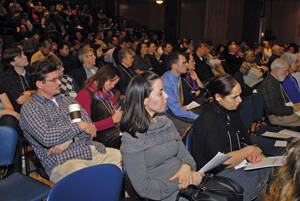Who are they? Where did they go? Are they ever coming back? A search party of 600 or so braved mountains of snow outside Fordham University’s Lincoln Center campus in New York to discuss the whereabouts of twenty-somethings in the Catholic Church on Jan. 28-29. The operating principle behind “Lost? Twenty-Somethings and the Church,” a conference sponsored by the Francis and Ann Curran Center for American Catholic Studies and the Fordham Center on Religion and Culture, was the widely accepted notion that twenty-somethings raised as Catholics are swelling the ranks of the religiously unaffiliated.
Several studies have confirmed this suspicion, most notably a Pew Research study that found that 25 percent of adults under 30 describe their religious affiliation as atheist, agnostic or nothing in particular. James Davidson, an emeritus professor of sociology at Purdue University, noted his discomfort with some interpretations of the research. Davidson said it overstates the case to label the newly unaffiliated as “former Catholics.”
“Viewing them as ‘former Catholics’ suggests that they have made a clean break with the church,” Davidson said. “It is true they don’t belong to local parishes or support the church in any other way…. But, by canon law, they are still Catholic, and—when you get to know them a little better than you do in a telephone interview—you learn that many of them are still very Catholic and think of themselves that way.”
Professor Robert Putnam of Harvard University strongly disagreed. Putnam is a co-author with David Campbell of the recently published book American Grace: How Religion Divides and Unites Us. He judged Davidson’s opinion to be far too optimistic. “The one-third who are not affiliated are not Catholic despite Jim wanting it to be so,” he said, noting that this group has no measurable ties to Catholic practice or identity.
Campbell, a professor of political science at the University of Notre Dame, mentioned that a significant portion of those young adults leaving the church do so because they are uncomfortable with what they perceive to be an inappropriate mixing of religion and conservative politics. Their own political instincts do not fit any neat categories. For instance, Catholics under 30 tend to be liberal on the issue of homosexuality but more pro-life than their parents.
Donna Freitas, associate professor of religion at Hofstra University and author of Sex and the Soul: Juggling Sexuality, Spirituality, Romance, and Religion on America’s College Campuses, spoke about “hook-up culture” on America’s college campuses. Her study found that undergraduates—with the exception of evangelical Christians—are both sexually active and deeply unsatisfied, reporting feelings of loneliness despite frequent hook-ups.
One of the few panelists at the conference who was himself twenty- something, Patrick Landry, a middle school teacher, drew loud applause when he confessed that he was in the “murky, messy middle” in terms of the church’s teachings on sex and felt that many of his friends likewise struggled to reconcile those teachings with their lived faith lives.
“We feel disconnected,” said 23-year-old Jennifer Sawyer. “People are talking about us rather than to us.” Sawyer also spoke of the “in-between-ness” she and her friends feel—unmarried, childless and working at entry-level jobs that seem to have little future. “We graduated into the worst financial climate since the Great Depression. Many of my friends are getting less optimistic that good things are ahead for us.”
Sawyer is right to be concerned. Twenty-somethings are too often seen but not heard in discussions about the church’s future, but her cohort is not the future of the church. It is the present. They might not look, act, think or believe the same way their parents did, but they are here now, seeking greater meaning and purpose in their lives. And they are keenly aware of how underserved they often are by their own faith community. They may be “seekers,” but that does not mean they are lost.
For the church, their plight brings to mind a Gospel teaching: “Which of you, if you had 100 sheep, and lost one of them, would not leave the 99 in the wilderness, and go after the one that was lost until he found it?” (Lk 15: 4). The “Lost” conference raised the notion that perhaps the paradigm of the good shepherd has been turned inside out. Is the church more concerned with tending to the one remaining sheep than with the 99 roaming the wild? If that is the case, who is actually lost: twenty-somethings or the church itself?








